
AMchat
AM (Advanced Mathematics) Chat is a large language model that integrates advanced mathematical knowledge, exercises in higher mathematics, and their solutions. AM (Advanced Mathematics) chat 高等数学大模型。一个集成数学知识和高等数学习题及其解答的大语言模型。
Stars: 153
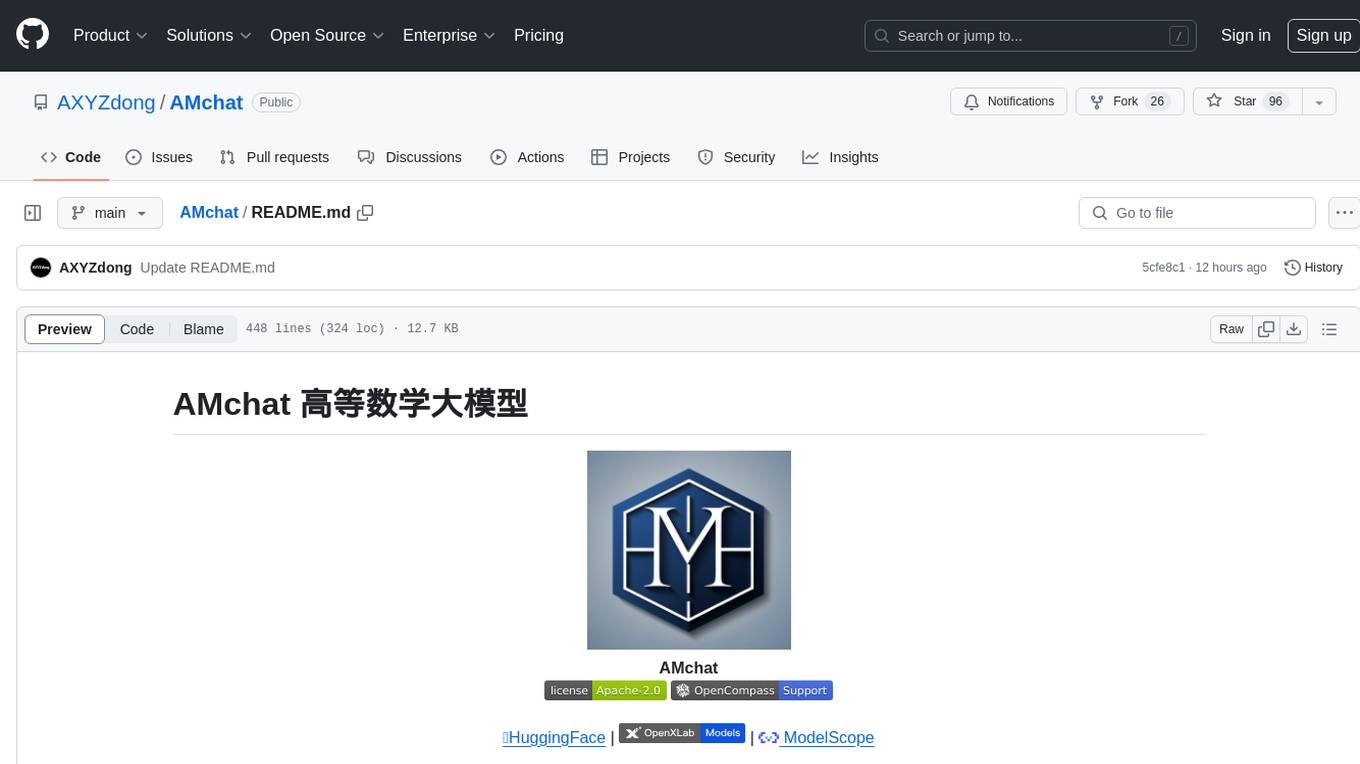
AMchat is a large language model that integrates advanced math concepts, exercises, and solutions. The model is based on the InternLM2-Math-7B model and is specifically designed to answer advanced math problems. It provides a comprehensive dataset that combines Math and advanced math exercises and solutions. Users can download the model from ModelScope or OpenXLab, deploy it locally or using Docker, and even retrain it using XTuner for fine-tuning. The tool also supports LMDeploy for quantization, OpenCompass for evaluation, and various other features for model deployment and evaluation. The project contributors have provided detailed documentation and guides for users to utilize the tool effectively.
README:
AM (Advanced Mathematics) chat 是一个集成了数学知识和高等数学习题及其解答的大语言模型。该模型使用 Math 和高等数学习题及其解析融合的数据集,基于 InternLM2-Math-7B 模型,通过 xtuner 微调,专门设计用于解答高等数学问题。
如果你觉得这个项目对你有帮助,欢迎 ⭐ Star,让更多的人发现它!
[2024.08.09] 我们发布了Q8_0量化模型 AMchat-q8_0.gguf。
[2024.06.23] InternLM2-Math-Plus-20B 模型微调。
[2024.06.22] InternLM2-Math-Plus-1.8B 模型微调,开源小规模数据集。
[2024.06.21] 更新README,InternLM2-Math-Plus-7B 模型微调。
[2024.03.24] 2024浦源大模型系列挑战赛(春季赛)Top12,创新创意奖。
[2024.03.14] 模型上传至HuggingFace。
[2024.03.08] 完善了README,增加目录、技术路线。增加README_en-US.md。
[2024.02.06] 支持了Docker部署。
[2024.02.01] AMchat第一版部署上线 https://openxlab.org.cn/apps/detail/youngdon/AMchat 🚀
- 下载模型
从 ModelScope
参考 模型的下载 。
pip install modelscopefrom modelscope.hub.snapshot_download import snapshot_download
model_dir = snapshot_download('yondong/AMchat', cache_dir='./')从 OpenXLab
参考 下载模型 。
pip install openxlabfrom openxlab.model import download
download(model_repo='youngdon/AMchat',
model_name='AMchat', output='./')- 本地部署
git clone https://github.com/AXYZdong/AMchat.git
python start.py- Docker部署
docker run -t -i --rm --gpus all -p 8501:8501 guidonsdocker/amchat:latest bash start.sh- clone 本项目
git clone https://github.com/AXYZdong/AMchat.git
cd AMchat- 创建虚拟环境
conda env create -f environment.yml
conda activate AMchat
pip install xtuner- 准备配置文件
# 列出所有内置配置
xtuner list-cfg
mkdir -p /root/math/data
mkdir /root/math/config && cd /root/math/config
xtuner copy-cfg internlm2_chat_7b_qlora_oasst1_e3 .- 模型下载
mkdir -p /root/math/modeldownload.py
import torch
from modelscope import snapshot_download, AutoModel, AutoTokenizer
import os
model_dir = snapshot_download('Shanghai_AI_Laboratory/internlm2-math-7b', cache_dir='/root/math/model')- 修改配置文件
仓库中
config文件夹下已经提供了一个微调的配置文件,可以参考internlm_chat_7b_qlora_oasst1_e3_copy.py。 可以直接使用,注意修改pretrained_model_name_or_path和data_path的路径。
cd /root/math/config
vim internlm_chat_7b_qlora_oasst1_e3_copy.py# 修改模型为本地路径
- pretrained_model_name_or_path = 'internlm/internlm-chat-7b'
+ pretrained_model_name_or_path = './internlm2-math-7b'
# 修改训练数据集为本地路径
- data_path = 'timdettmers/openassistant-guanaco'
+ data_path = './data'- 开始微调
xtuner train /root/math/config/internlm2_chat_7b_qlora_oasst1_e3_copy.py- PTH 模型转换为 HuggingFace 模型
mkdir hf
export MKL_SERVICE_FORCE_INTEL=1
export MKL_THREADING_LAYER=GNU
xtuner convert pth_to_hf ./internlm2_chat_7b_qlora_oasst1_e3_copy.py \
./work_dirs/internlm2_chat_7b_qlora_oasst1_e3_copy/epoch_3.pth \
./hf- HuggingFace 模型合并到大语言模型
# 原始模型参数存放的位置
export NAME_OR_PATH_TO_LLM=/root/math/model/Shanghai_AI_Laboratory/internlm2-math-7b
# Hugging Face格式参数存放的位置
export NAME_OR_PATH_TO_ADAPTER=/root/math/config/hf
# 最终Merge后的参数存放的位置
mkdir /root/math/config/work_dirs/hf_merge
export SAVE_PATH=/root/math/config/work_dirs/hf_merge
# 执行参数Merge
xtuner convert merge \
$NAME_OR_PATH_TO_LLM \
$NAME_OR_PATH_TO_ADAPTER \
$SAVE_PATH \
--max-shard-size 2GB- Demo
streamlit run web_demo.py --server.address=0.0.0.0 --server.port 7860仅需要 Fork 本仓库,然后在 OpenXLab 上创建一个新的项目,将 Fork 的仓库与新建的项目关联,即可在 OpenXLab 上部署 AMchat。
- AMchat 与 InternLM2-Math-7B 在积分问题上对于同一问题的解答。 AMchat 回答正确,InternLM2-Math-7B 回答错误。
- 首先安装LMDeploy
pip install -U lmdeploy- 然后转换模型为
turbomind格式
--dst-path: 可以指定转换后的模型存储位置。
lmdeploy convert internlm2-chat-7b 要转化的模型地址 --dst-path 转换后的模型地址- LMDeploy Chat 对话
lmdeploy chat turbomind 转换后的turbomind模型地址- 安装 OpenCompass
git clone https://github.com/open-compass/opencompass
cd opencompass
pip install -e .- 下载解压数据集
cp /share/temp/datasets/OpenCompassData-core-20231110.zip /root/opencompass/
unzip OpenCompassData-core-20231110.zip- 评测启动!
python run.py \
--datasets math_gen \
--hf-path 模型地址 \
--tokenizer-path tokenizer地址 \
--tokenizer-kwargs padding_side='left' truncation='left' trust_remote_code=True \
--model-kwargs device_map='auto' trust_remote_code=True \
--max-seq-len 2048 \
--max-out-len 16 \
--batch-size 2 \
--num-gpus 1 \
--debugW4 量化评测
-
W4量化
lmdeploy lite auto_awq 要量化的模型地址 --work-dir 量化后的模型地址- 转化为
TurbMind
lmdeploy convert internlm2-chat-7b 量化后的模型地址 --model-format awq --group-size 128 --dst-path 转换后的模型地址- 评测
config编写
from mmengine.config import read_base
from opencompass.models.turbomind import TurboMindModel
with read_base():
# choose a list of datasets
from .datasets.ceval.ceval_gen import ceval_datasets
# and output the results in a choosen format
# from .summarizers.medium import summarizer
datasets = [*ceval_datasets]
internlm2_chat_7b = dict(
type=TurboMindModel,
abbr='internlm2-chat-7b-turbomind',
path='转换后的模型地址',
engine_config=dict(session_len=512,
max_batch_size=2,
rope_scaling_factor=1.0),
gen_config=dict(top_k=1,
top_p=0.8,
temperature=1.0,
max_new_tokens=100),
max_out_len=100,
max_seq_len=512,
batch_size=2,
concurrency=1,
# meta_template=internlm_meta_template,
run_cfg=dict(num_gpus=1, num_procs=1),
)
models = [internlm2_chat_7b]- 评测启动!
python run.py configs/eval_turbomind.py -w 指定结果保存路径KV Cache 量化评测
- 转换为
TurbMind
lmdeploy convert internlm2-chat-7b 模型路径 --dst-path 转换后模型路径- 计算与获得量化参数
# 计算
lmdeploy lite calibrate 模型路径 --calib-dataset 'ptb' --calib-samples 128 --calib-seqlen 2048 --work-dir 参数保存路径
# 获取量化参数
lmdeploy lite kv_qparams 参数保存路径 转换后模型路径/triton_models/weights/ --num-tp 1- 更改
quant_policy改成4,更改上述config里面的路径 - 评测启动!
python run.py configs/eval_turbomind.py -w 结果保存路径- 结果文件与评测数据集可在同目录文件results中获取。
- 张友东-项目负责人 (Datawhale成员 书生·浦语实战营助教 负责模型训练,OpenXlab应用部署,数据收集,RAG内容整理,InternLM2-Math-Plus微调规划)
- 宋志学-项目负责人 (Datawhale成员 书生·浦语实战营助教 负责项目规划,RAG框架)
- 肖鸿儒-项目负责人 (Datawhale成员 同济大学 书生·浦语实战营助教 负责数据收集,数据集整理及增强,模型量化与评测,RAG推理与验证)
- 程宏 (书生·浦语实战营助教&Datawhale鲸英助教 InternLM2-Math-Plus-7B 模型微调&部署)
- 莫宝琪(玉柴工程研究院 InternLM2-Math-Plus-1.8B 模型微调)
- 陈辅元(甘肃政法大学 InternLM2-Math-Plus-20B 模型微调)
- 龚鹤扬 (中国科学技术大学统计学博士 LMDeploy 模型量化)
- 揭熔阳 (Datawhale成员 哈尔滨工业大学(威海) 数据收集 RAG内容整理)
- 彭琛 (Datawhale成员 数据收集)
- 王新茗 (数据收集)
- 刘志文 (Datawhale成员 山东女子学院 数据收集)
- 王睿玥 (Northeastern University 数据收集)
- 陈逸涵 (Datawhale成员 北京邮电大学 数据收集)
- guidons (东北大学 docker部署)
- eltociear (Board member at I-Tecnology Co., Ltd.,增加 Japanese README)
感谢上海人工智能实验室组织的 书生·浦语实战营 学习活动~
感谢 OpenXLab 对项目部署的算力支持~
感谢 浦语小助手 对项目的支持~
感谢上海人工智能实验室推出的书生·浦语大模型实战营,为我们的项目提供宝贵的技术指导和强大的算力支持!
InternLM-tutorial、InternStudio、xtuner、InternLM-Math
@misc{2024AMchat,
title={AMchat: A large language model integrating advanced math concepts, exercises, and solutions},
author={AMchat Contributors},
howpublished = {\url{https://github.com/AXYZdong/AMchat}},
year={2024}
}该项目采用 Apache License 2.0 开源许可证 同时,请遵守所使用的模型与数据集的许可证。
For Tasks:
Click tags to check more tools for each tasksFor Jobs:
Alternative AI tools for AMchat
Similar Open Source Tools

AMchat
AMchat is a large language model that integrates advanced math concepts, exercises, and solutions. The model is based on the InternLM2-Math-7B model and is specifically designed to answer advanced math problems. It provides a comprehensive dataset that combines Math and advanced math exercises and solutions. Users can download the model from ModelScope or OpenXLab, deploy it locally or using Docker, and even retrain it using XTuner for fine-tuning. The tool also supports LMDeploy for quantization, OpenCompass for evaluation, and various other features for model deployment and evaluation. The project contributors have provided detailed documentation and guides for users to utilize the tool effectively.
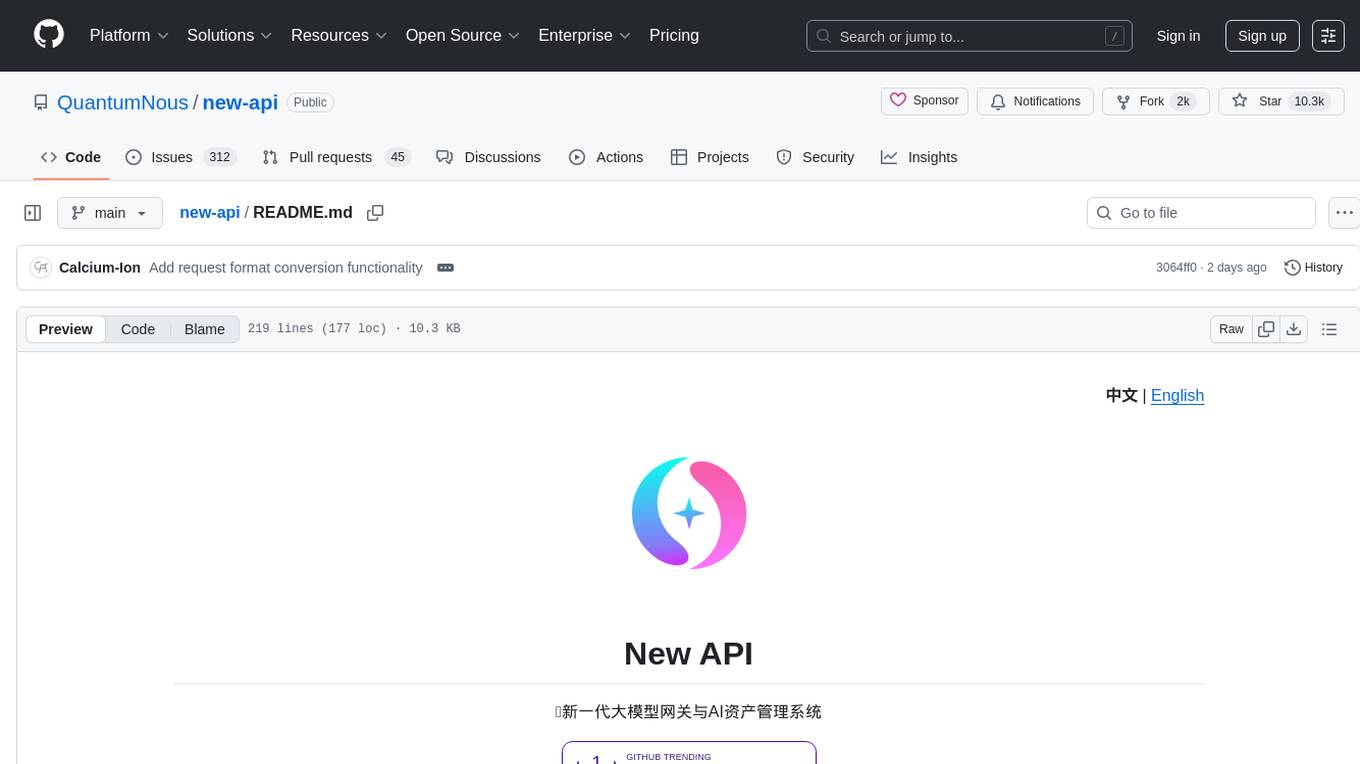
new-api
New API is a next-generation large model gateway and AI asset management system that provides a wide range of features, including a new UI interface, multi-language support, online recharge function, key query for usage quota, compatibility with the original One API database, model charging by usage count, channel weighted randomization, data dashboard, token grouping and model restrictions, support for various authorization login methods, support for Rerank models, OpenAI Realtime API, Claude Messages format, reasoning effort setting, content reasoning, user-specific model rate limiting, request format conversion, cache billing support, and various model support such as gpts, Midjourney-Proxy, Suno API, custom channels, Rerank models, Claude Messages format, Dify, and more.
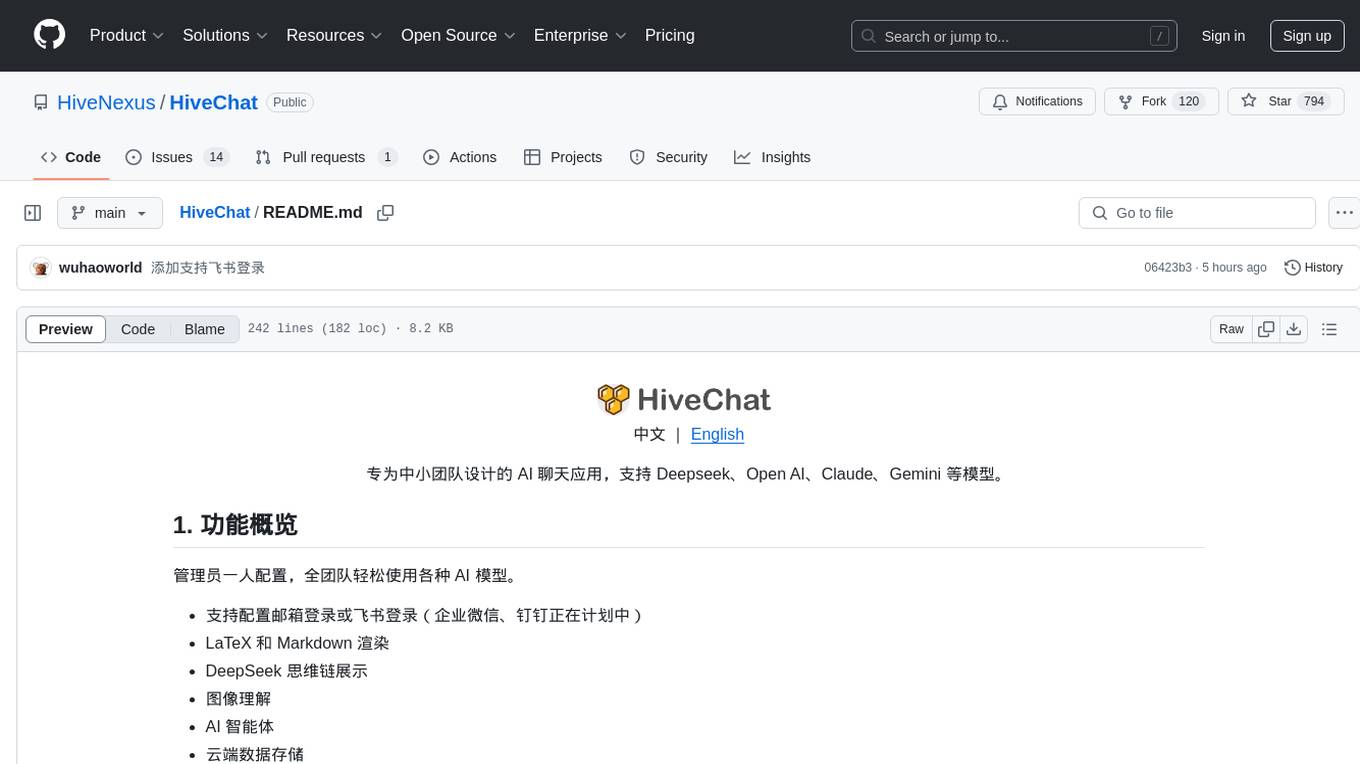
HiveChat
HiveChat is an AI chat application designed for small and medium teams. It supports various models such as DeepSeek, Open AI, Claude, and Gemini. The tool allows easy configuration by one administrator for the entire team to use different AI models. It supports features like email or Feishu login, LaTeX and Markdown rendering, DeepSeek mind map display, image understanding, AI agents, cloud data storage, and integration with multiple large model service providers. Users can engage in conversations by logging in, while administrators can configure AI service providers, manage users, and control account registration. The technology stack includes Next.js, Tailwindcss, Auth.js, PostgreSQL, Drizzle ORM, and Ant Design.
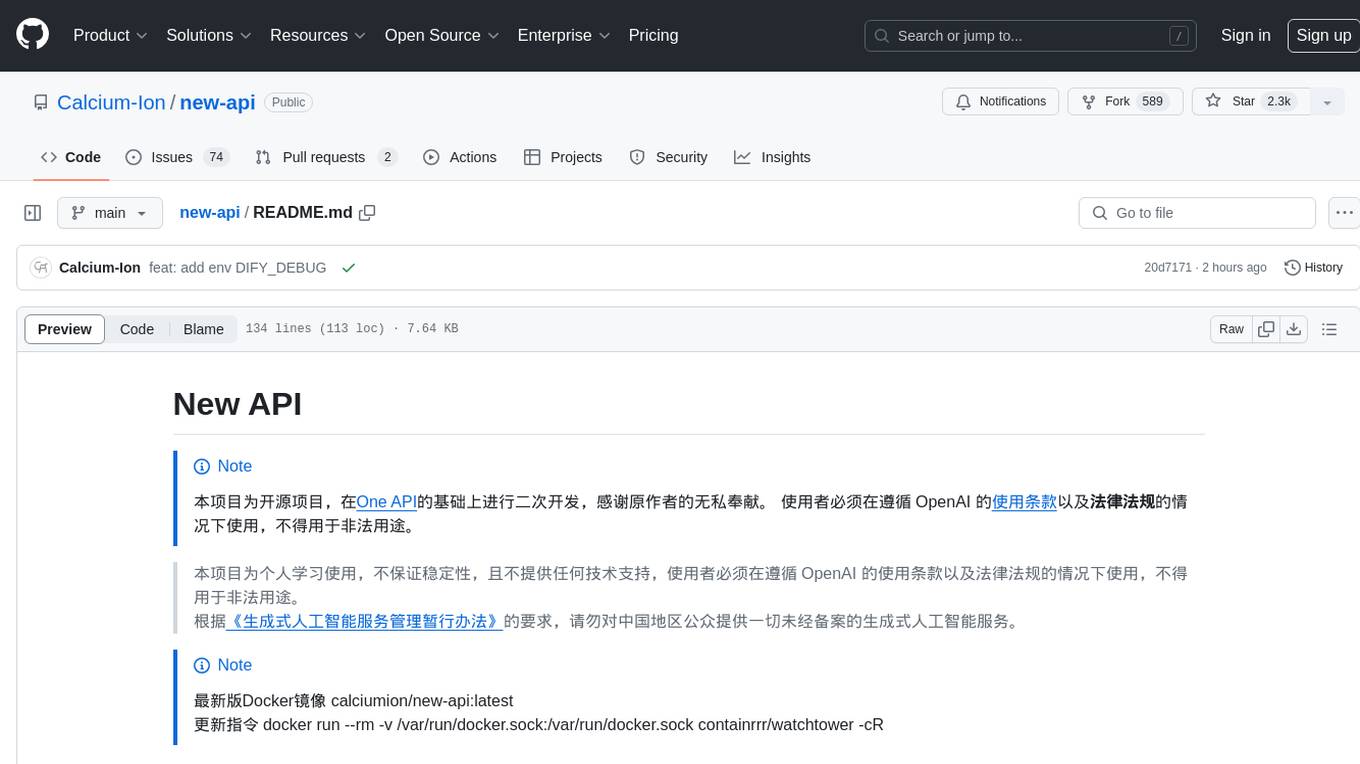
new-api
New API is an open-source project based on One API with additional features and improvements. It offers a new UI interface, supports Midjourney-Proxy(Plus) interface, online recharge functionality, model-based charging, channel weight randomization, data dashboard, token-controlled models, Telegram authorization login, Suno API support, Rerank model integration, and various third-party models. Users can customize models, retry channels, and configure caching settings. The deployment can be done using Docker with SQLite or MySQL databases. The project provides documentation for Midjourney and Suno interfaces, and it is suitable for AI enthusiasts and developers looking to enhance AI capabilities.
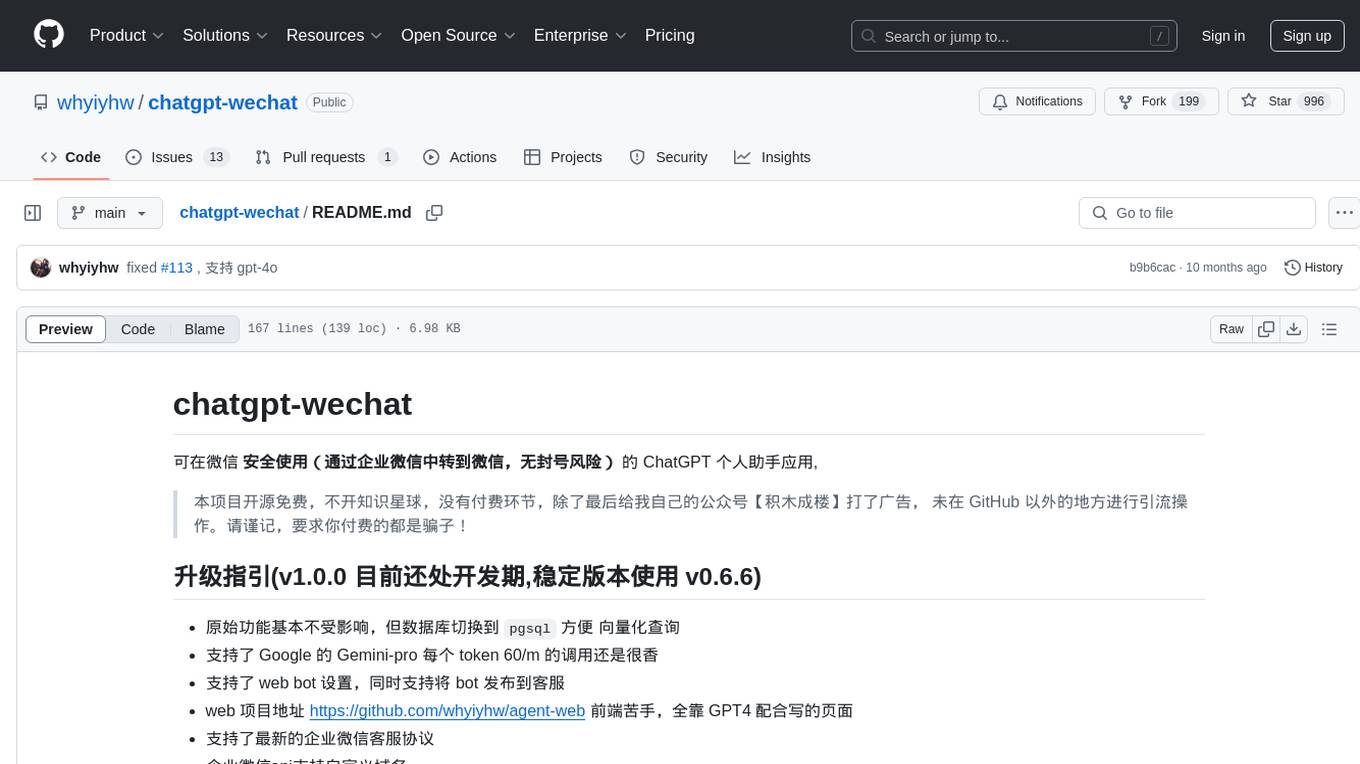
chatgpt-wechat
ChatGPT-WeChat is a personal assistant application that can be safely used on WeChat through enterprise WeChat without the risk of being banned. The project is open source and free, with no paid sections or external traffic operations except for advertising on the author's public account '积木成楼'. It supports various features such as secure usage on WeChat, multi-channel customer service message integration, proxy support, session management, rapid message response, voice and image messaging, drawing capabilities, private data storage, plugin support, and more. Users can also develop their own capabilities following the rules provided. The project is currently in development with stable versions available for use.
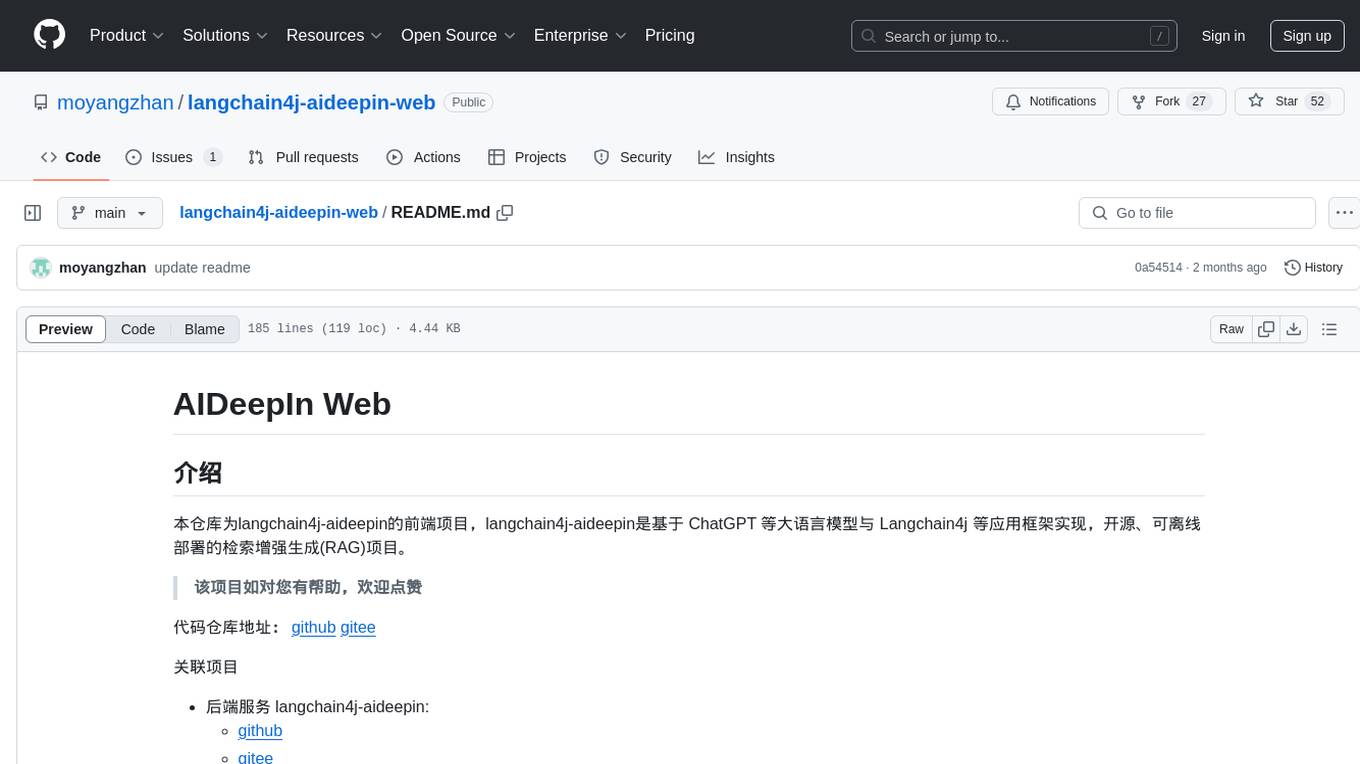
langchain4j-aideepin-web
The langchain4j-aideepin-web repository is the frontend project of langchain4j-aideepin, an open-source, offline deployable retrieval enhancement generation (RAG) project based on large language models such as ChatGPT and application frameworks such as Langchain4j. It includes features like registration & login, multi-sessions (multi-roles), image generation (text-to-image, image editing, image-to-image), suggestions, quota control, knowledge base (RAG) based on large models, model switching, and search engine switching.
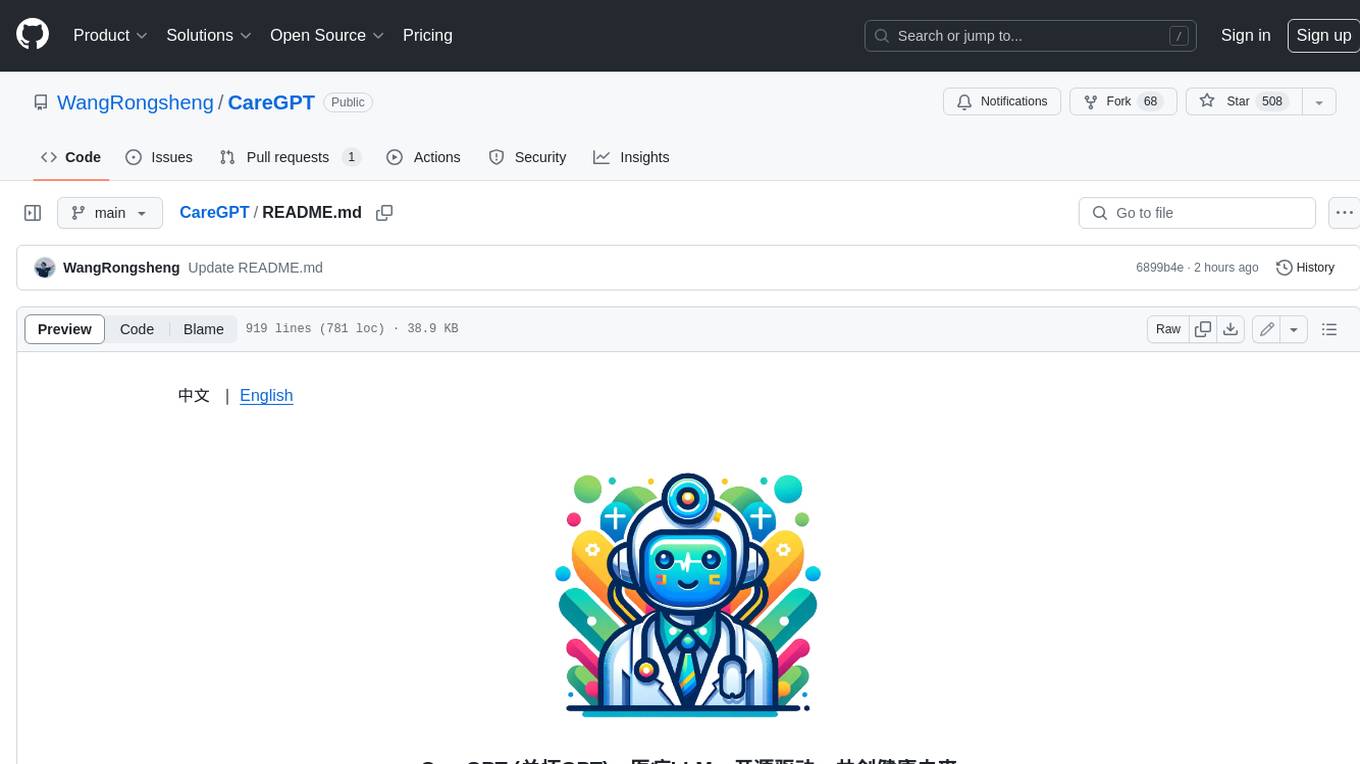
CareGPT
CareGPT is a medical large language model (LLM) that explores medical data, training, and deployment related research work. It integrates resources, open-source models, rich data, and efficient deployment methods. It supports various medical tasks, including patient diagnosis, medical dialogue, and medical knowledge integration. The model has been fine-tuned on diverse medical datasets to enhance its performance in the healthcare domain.
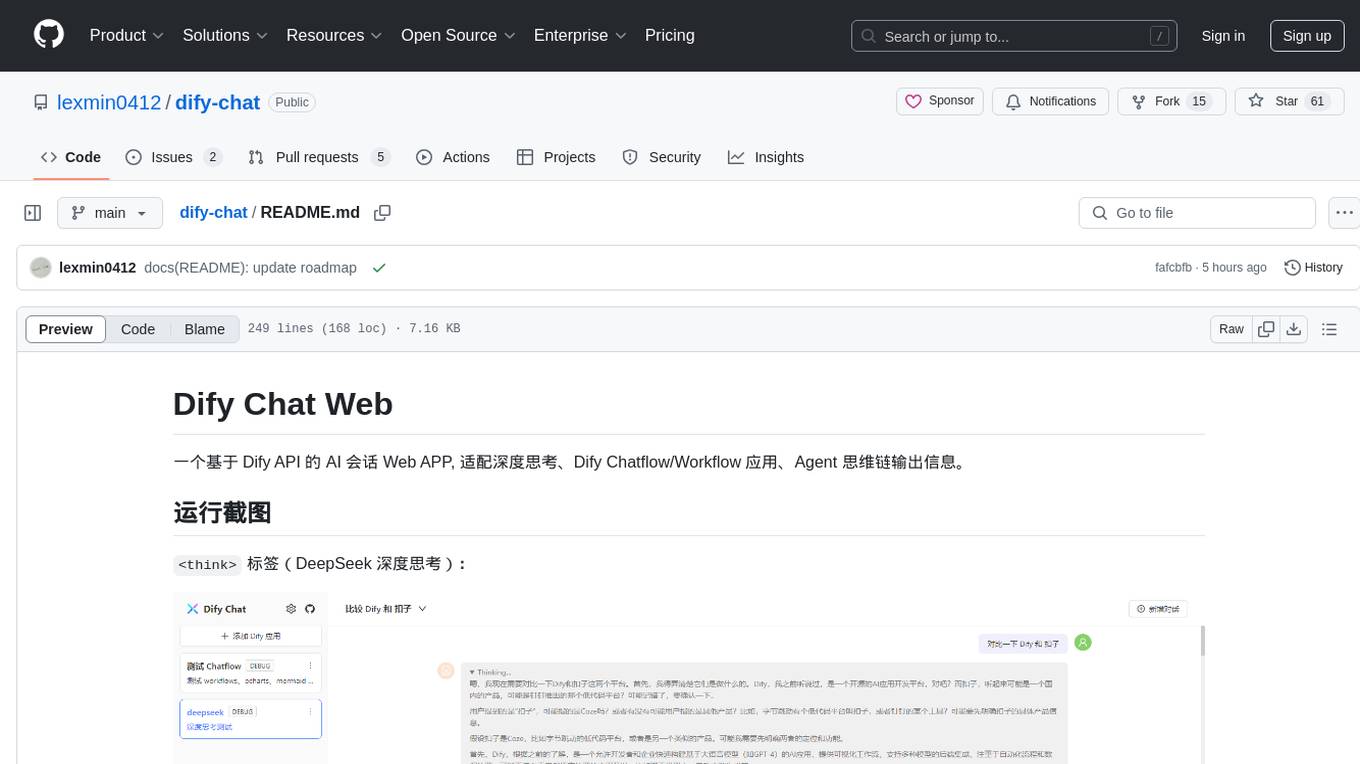
dify-chat
Dify Chat Web is an AI conversation web app based on the Dify API, compatible with DeepSeek, Dify Chatflow/Workflow applications, and Agent Mind Chain output information. It supports multiple scenarios, flexible deployment without backend dependencies, efficient integration with reusable React components, and style customization for unique business system styles.
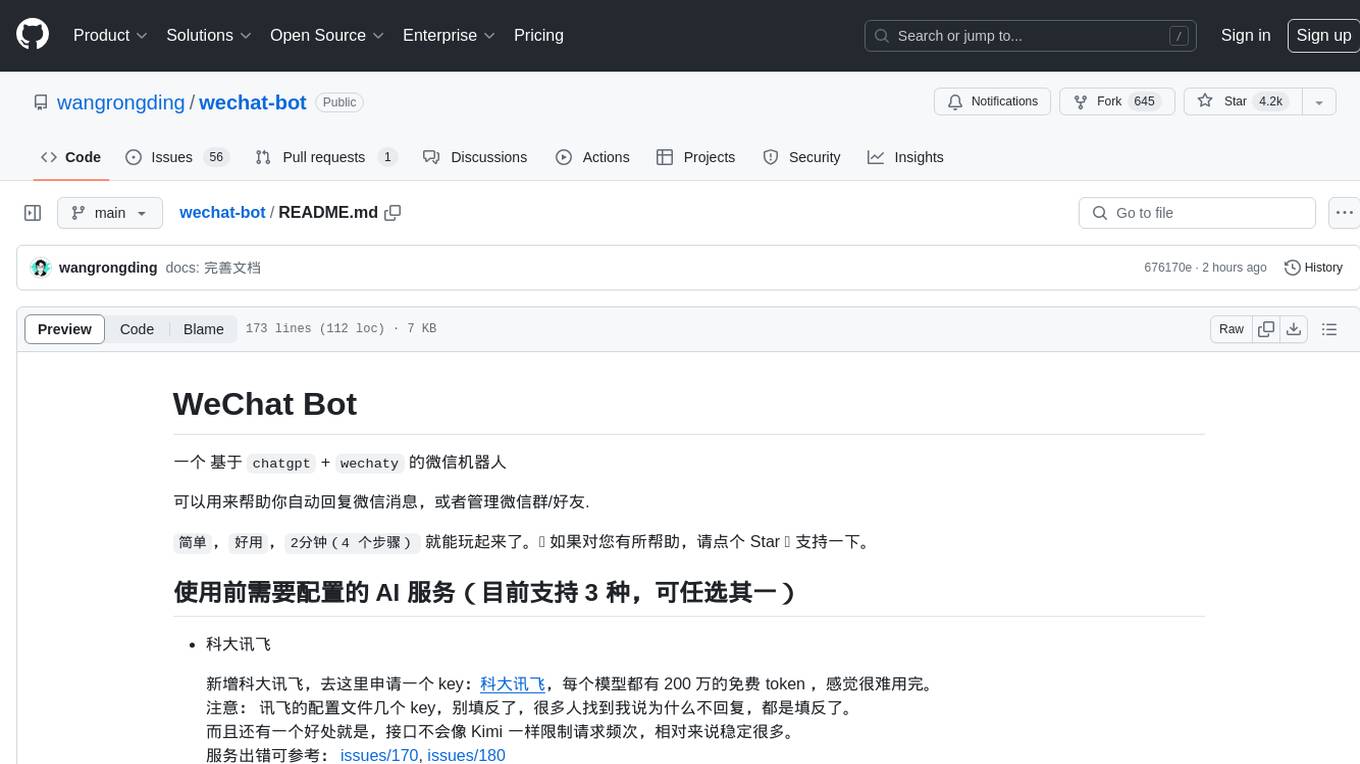
wechat-bot
WeChat Bot is a simple and easy-to-use WeChat robot based on chatgpt and wechaty. It can help you automatically reply to WeChat messages or manage WeChat groups/friends. The tool requires configuration of AI services such as Xunfei, Kimi, or ChatGPT. Users can customize the tool to automatically reply to group or private chat messages based on predefined conditions. The tool supports running in Docker for easy deployment and provides a convenient way to interact with various AI services for WeChat automation.
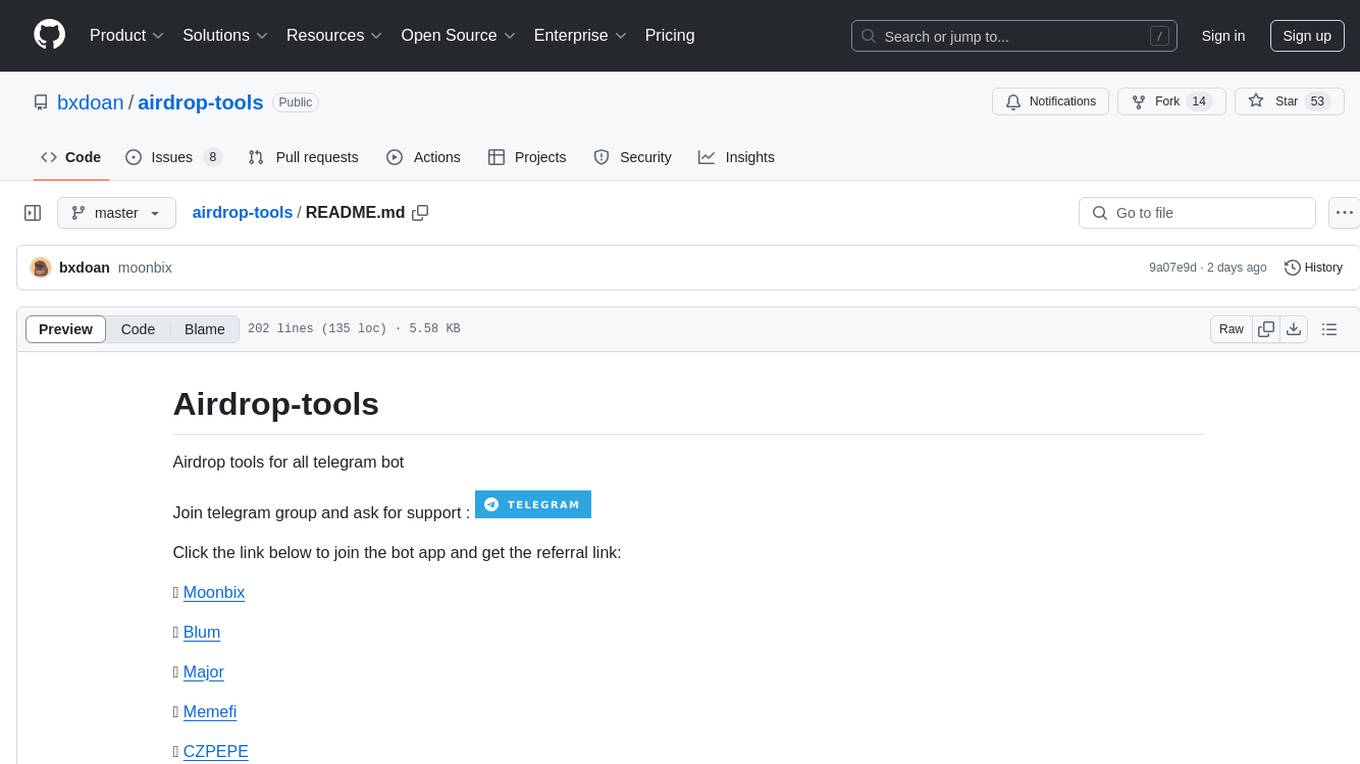
airdrop-tools
Airdrop-tools is a repository containing tools for all Telegram bots. Users can join the Telegram group for support and access various bot apps like Moonbix, Blum, Major, Memefi, and more. The setup requires Node.js and Python, with instructions on creating data directories and installing extensions. Users can run different tools like Blum, Major, Moonbix, Yescoin, Matchain, Fintopio, Agent301, IAMDOG, Banana, Cats, Wonton, and Xkucoin by following specific commands. The repository also provides contact information and options for supporting the creator.
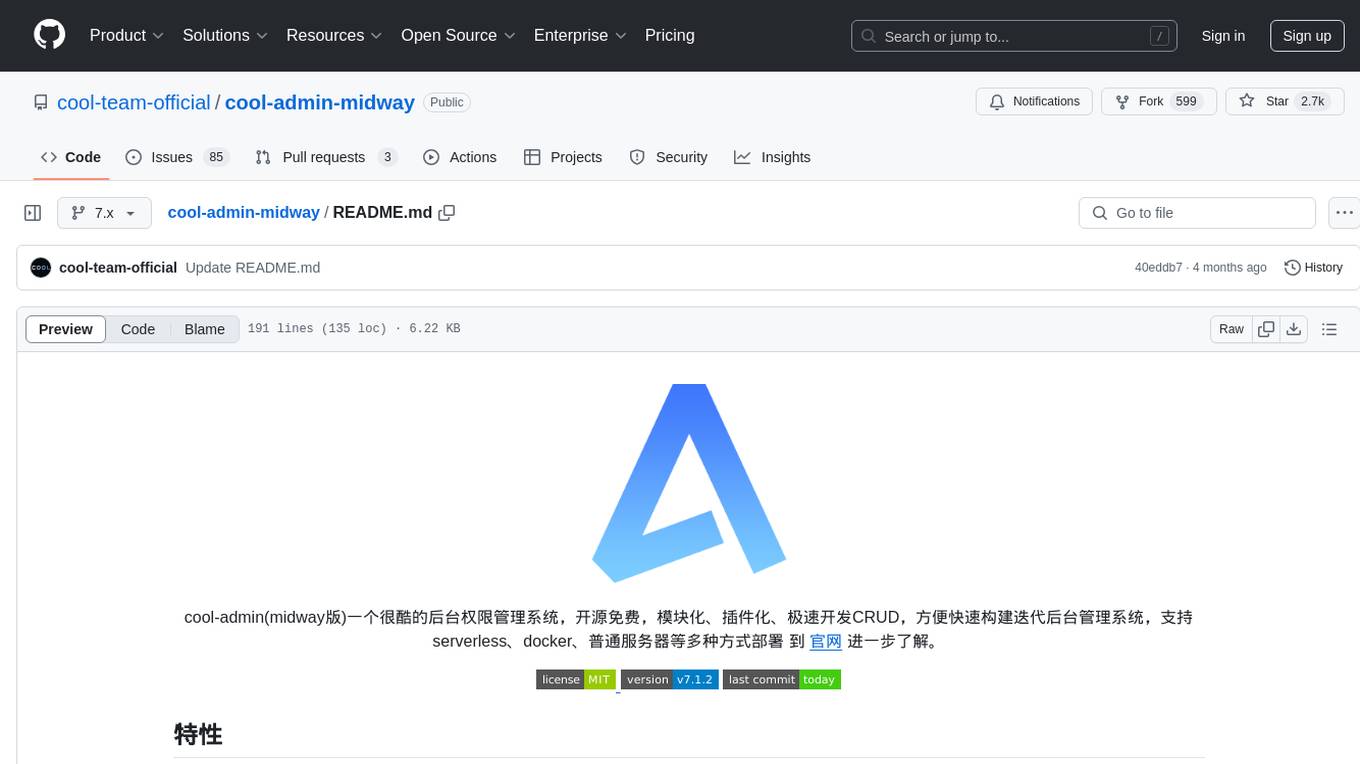
cool-admin-midway
Cool-admin (midway version) is a cool open-source backend permission management system that supports modular, plugin-based, rapid CRUD development. It facilitates the quick construction and iteration of backend management systems, deployable in various ways such as serverless, docker, and traditional servers. It features AI coding for generating APIs and frontend pages, flow orchestration for drag-and-drop functionality, modular and plugin-based design for clear and maintainable code. The tech stack includes Node.js, Midway.js, Koa.js, TypeScript for backend, and Vue.js, Element-Plus, JSX, Pinia, Vue Router for frontend. It offers friendly technology choices for both frontend and backend developers, with TypeScript syntax similar to Java and PHP for backend developers. The tool is suitable for those looking for a modern, efficient, and fast development experience.
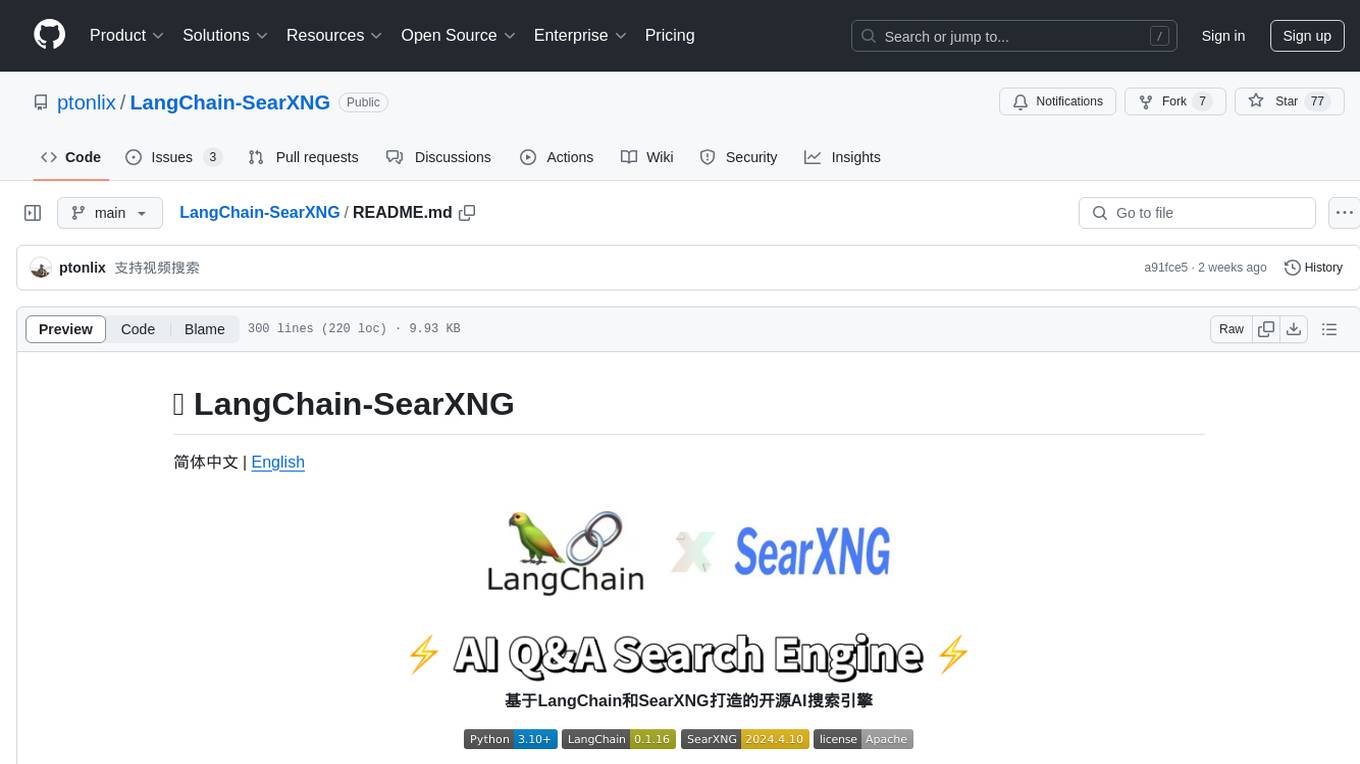
LangChain-SearXNG
LangChain-SearXNG is an open-source AI search engine built on LangChain and SearXNG. It supports faster and more accurate search and question-answering functionalities. Users can deploy SearXNG and set up Python environment to run LangChain-SearXNG. The tool integrates AI models like OpenAI and ZhipuAI for search queries. It offers two search modes: Searxng and ZhipuWebSearch, allowing users to control the search workflow based on input parameters. LangChain-SearXNG v2 version enhances response speed and content quality compared to the previous version, providing a detailed configuration guide and showcasing the effectiveness of different search modes through comparisons.
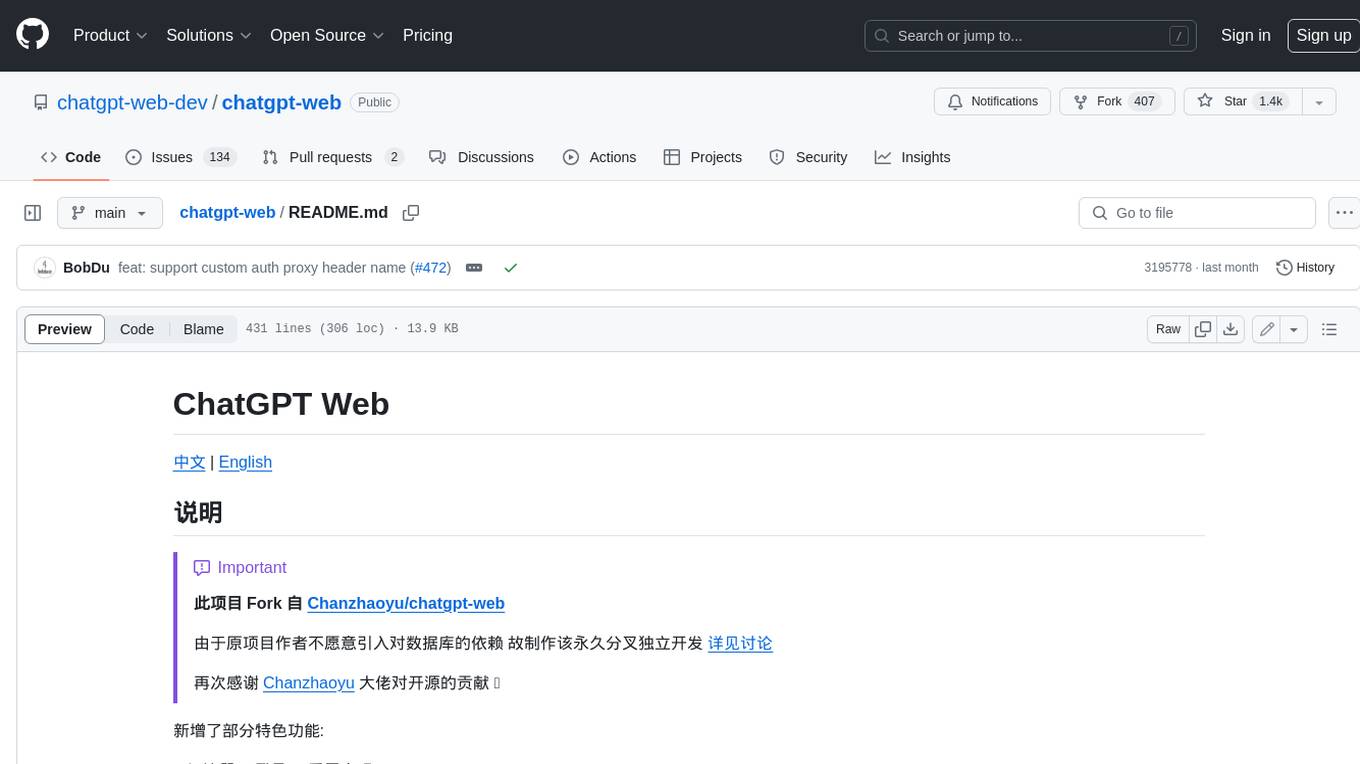
chatgpt-web
ChatGPT Web is a web application that provides access to the ChatGPT API. It offers two non-official methods to interact with ChatGPT: through the ChatGPTAPI (using the `gpt-3.5-turbo-0301` model) or through the ChatGPTUnofficialProxyAPI (using a web access token). The ChatGPTAPI method is more reliable but requires an OpenAI API key, while the ChatGPTUnofficialProxyAPI method is free but less reliable. The application includes features such as user registration and login, synchronization of conversation history, customization of API keys and sensitive words, and management of users and keys. It also provides a user interface for interacting with ChatGPT and supports multiple languages and themes.
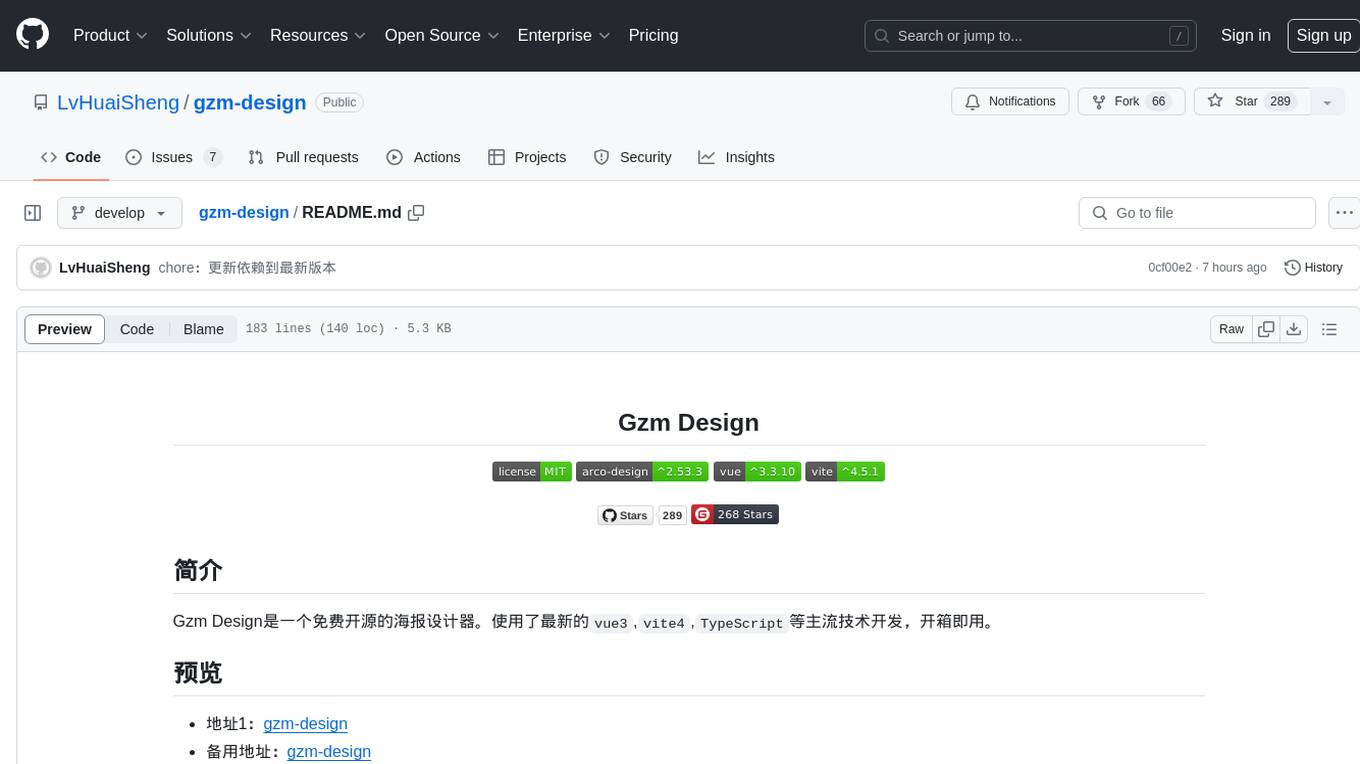
gzm-design
Gzm Design is a free and open-source poster designer developed using the latest mainstream technologies such as Vue3, Vite4, TypeScript, etc. It provides features like PSD import, JSON import, multiple pages support, shortcut key support, template import, layer management, ruler tool, pen tool, element editing, preview, file download, canvas zooming and dragging, border stroke, filling, blending modes, text formatting, group handling, canvas size modification, rich text support, masking, shadow effects, undo/redo functionality, QR code tool, barcode tool, and ruler line npm package encapsulation.
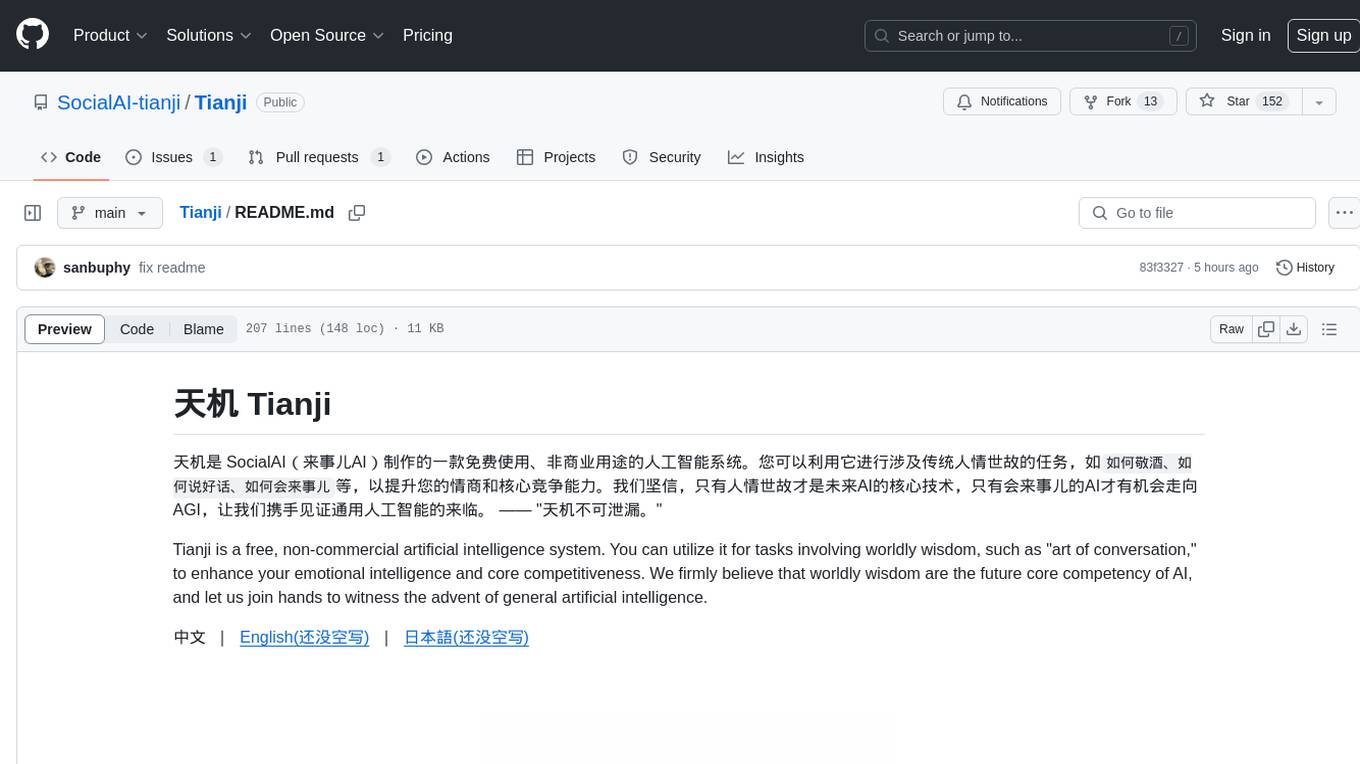
Tianji
Tianji is a free, non-commercial artificial intelligence system developed by SocialAI for tasks involving worldly wisdom, such as etiquette, hospitality, gifting, wishes, communication, awkwardness resolution, and conflict handling. It includes four main technical routes: pure prompt, Agent architecture, knowledge base, and model training. Users can find corresponding source code for these routes in the tianji directory to replicate their own vertical domain AI applications. The project aims to accelerate the penetration of AI into various fields and enhance AI's core competencies.
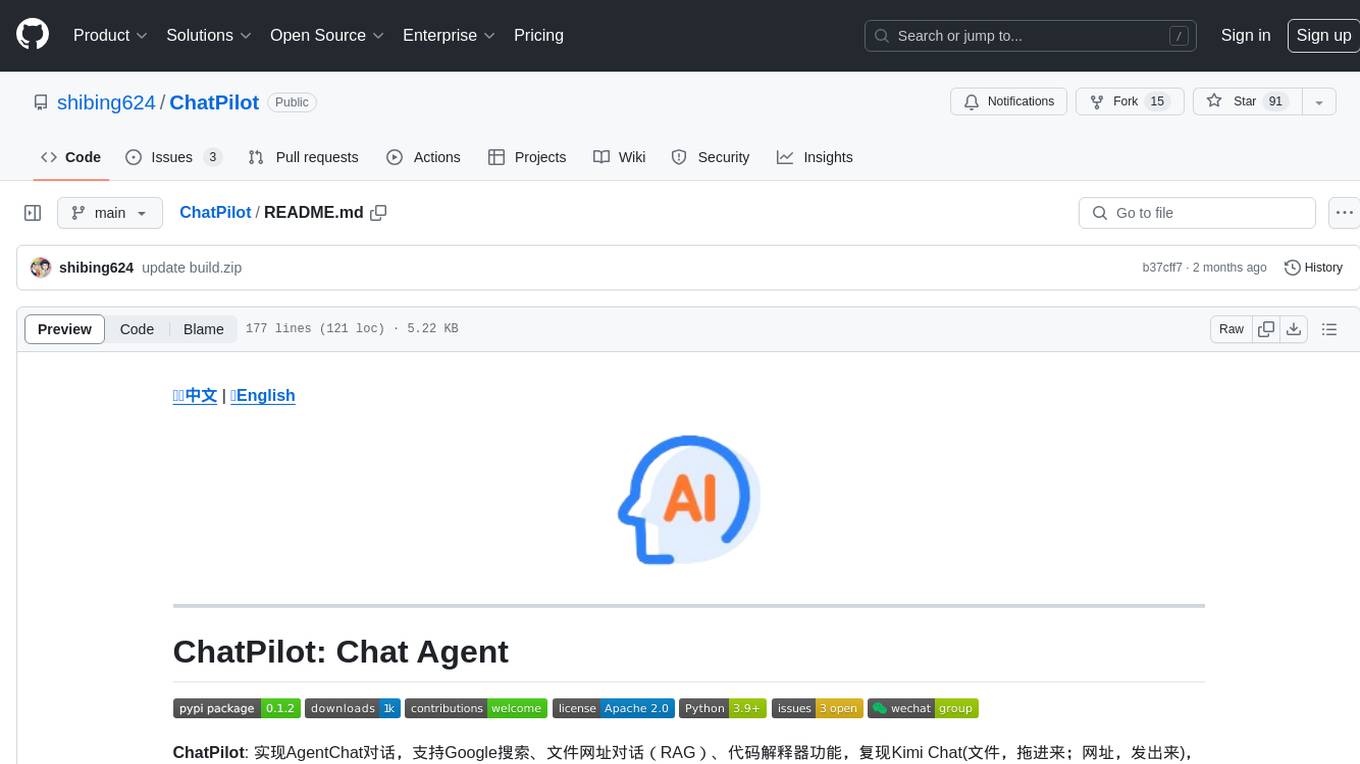
ChatPilot
ChatPilot is a chat agent tool that enables AgentChat conversations, supports Google search, URL conversation (RAG), and code interpreter functionality, replicates Kimi Chat (file, drag and drop; URL, send out), and supports OpenAI/Azure API. It is based on LangChain and implements ReAct and OpenAI Function Call for agent Q&A dialogue. The tool supports various automatic tools such as online search using Google Search API, URL parsing tool, Python code interpreter, and enhanced RAG file Q&A with query rewriting support. It also allows front-end and back-end service separation using Svelte and FastAPI, respectively. Additionally, it supports voice input/output, image generation, user management, permission control, and chat record import/export.
For similar tasks

ai-on-gke
This repository contains assets related to AI/ML workloads on Google Kubernetes Engine (GKE). Run optimized AI/ML workloads with Google Kubernetes Engine (GKE) platform orchestration capabilities. A robust AI/ML platform considers the following layers: Infrastructure orchestration that support GPUs and TPUs for training and serving workloads at scale Flexible integration with distributed computing and data processing frameworks Support for multiple teams on the same infrastructure to maximize utilization of resources

ray
Ray is a unified framework for scaling AI and Python applications. It consists of a core distributed runtime and a set of AI libraries for simplifying ML compute, including Data, Train, Tune, RLlib, and Serve. Ray runs on any machine, cluster, cloud provider, and Kubernetes, and features a growing ecosystem of community integrations. With Ray, you can seamlessly scale the same code from a laptop to a cluster, making it easy to meet the compute-intensive demands of modern ML workloads.

labelbox-python
Labelbox is a data-centric AI platform for enterprises to develop, optimize, and use AI to solve problems and power new products and services. Enterprises use Labelbox to curate data, generate high-quality human feedback data for computer vision and LLMs, evaluate model performance, and automate tasks by combining AI and human-centric workflows. The academic & research community uses Labelbox for cutting-edge AI research.

djl
Deep Java Library (DJL) is an open-source, high-level, engine-agnostic Java framework for deep learning. It is designed to be easy to get started with and simple to use for Java developers. DJL provides a native Java development experience and allows users to integrate machine learning and deep learning models with their Java applications. The framework is deep learning engine agnostic, enabling users to switch engines at any point for optimal performance. DJL's ergonomic API interface guides users with best practices to accomplish deep learning tasks, such as running inference and training neural networks.

mlflow
MLflow is a platform to streamline machine learning development, including tracking experiments, packaging code into reproducible runs, and sharing and deploying models. MLflow offers a set of lightweight APIs that can be used with any existing machine learning application or library (TensorFlow, PyTorch, XGBoost, etc), wherever you currently run ML code (e.g. in notebooks, standalone applications or the cloud). MLflow's current components are:
* `MLflow Tracking

tt-metal
TT-NN is a python & C++ Neural Network OP library. It provides a low-level programming model, TT-Metalium, enabling kernel development for Tenstorrent hardware.

burn
Burn is a new comprehensive dynamic Deep Learning Framework built using Rust with extreme flexibility, compute efficiency and portability as its primary goals.

awsome-distributed-training
This repository contains reference architectures and test cases for distributed model training with Amazon SageMaker Hyperpod, AWS ParallelCluster, AWS Batch, and Amazon EKS. The test cases cover different types and sizes of models as well as different frameworks and parallel optimizations (Pytorch DDP/FSDP, MegatronLM, NemoMegatron...).
For similar jobs

weave
Weave is a toolkit for developing Generative AI applications, built by Weights & Biases. With Weave, you can log and debug language model inputs, outputs, and traces; build rigorous, apples-to-apples evaluations for language model use cases; and organize all the information generated across the LLM workflow, from experimentation to evaluations to production. Weave aims to bring rigor, best-practices, and composability to the inherently experimental process of developing Generative AI software, without introducing cognitive overhead.

agentcloud
AgentCloud is an open-source platform that enables companies to build and deploy private LLM chat apps, empowering teams to securely interact with their data. It comprises three main components: Agent Backend, Webapp, and Vector Proxy. To run this project locally, clone the repository, install Docker, and start the services. The project is licensed under the GNU Affero General Public License, version 3 only. Contributions and feedback are welcome from the community.

oss-fuzz-gen
This framework generates fuzz targets for real-world `C`/`C++` projects with various Large Language Models (LLM) and benchmarks them via the `OSS-Fuzz` platform. It manages to successfully leverage LLMs to generate valid fuzz targets (which generate non-zero coverage increase) for 160 C/C++ projects. The maximum line coverage increase is 29% from the existing human-written targets.

LLMStack
LLMStack is a no-code platform for building generative AI agents, workflows, and chatbots. It allows users to connect their own data, internal tools, and GPT-powered models without any coding experience. LLMStack can be deployed to the cloud or on-premise and can be accessed via HTTP API or triggered from Slack or Discord.

VisionCraft
The VisionCraft API is a free API for using over 100 different AI models. From images to sound.

kaito
Kaito is an operator that automates the AI/ML inference model deployment in a Kubernetes cluster. It manages large model files using container images, avoids tuning deployment parameters to fit GPU hardware by providing preset configurations, auto-provisions GPU nodes based on model requirements, and hosts large model images in the public Microsoft Container Registry (MCR) if the license allows. Using Kaito, the workflow of onboarding large AI inference models in Kubernetes is largely simplified.

PyRIT
PyRIT is an open access automation framework designed to empower security professionals and ML engineers to red team foundation models and their applications. It automates AI Red Teaming tasks to allow operators to focus on more complicated and time-consuming tasks and can also identify security harms such as misuse (e.g., malware generation, jailbreaking), and privacy harms (e.g., identity theft). The goal is to allow researchers to have a baseline of how well their model and entire inference pipeline is doing against different harm categories and to be able to compare that baseline to future iterations of their model. This allows them to have empirical data on how well their model is doing today, and detect any degradation of performance based on future improvements.

Azure-Analytics-and-AI-Engagement
The Azure-Analytics-and-AI-Engagement repository provides packaged Industry Scenario DREAM Demos with ARM templates (Containing a demo web application, Power BI reports, Synapse resources, AML Notebooks etc.) that can be deployed in a customer’s subscription using the CAPE tool within a matter of few hours. Partners can also deploy DREAM Demos in their own subscriptions using DPoC.


 ModelScope
ModelScope



